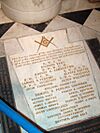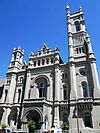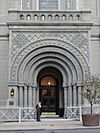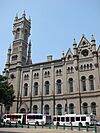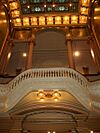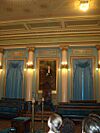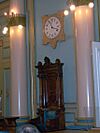Masonic Temple (Philadelphia, Pennsylvania) facts for kids
|
Philadelphia's Masonic Temple
|
|
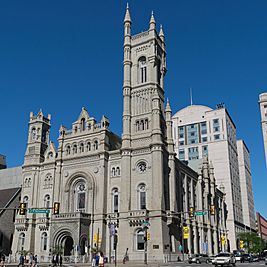
The Masonic Temple in 2015
|
|
| Location | 1 N. Broad Street Philadelphia, Pennsylvania |
|---|---|
| Built | 1868-73 |
| Architect | James H. Windrim (exterior) George Herzog (interior) |
| Architectural style | Norman |
| NRHP reference No. | 71000727 |
Quick facts for kids Significant dates |
|
| Added to NRHP | May 27, 1971 |
| Designated NHL | February 4, 1985 |
The Masonic Temple in Philadelphia is a very old and important building. It is the main home for the Grand Lodge of Pennsylvania, which is a group of Freemasons. You can find it at 1 North Broad Street, right across from Philadelphia City Hall.
This amazing building has a special library and museum. Thousands of people visit every year to see its beautiful design. Inside, there are seven large rooms called lodge rooms. These rooms are still used today for meetings by different Masonic groups in Philadelphia.
History of Masonic Temples in Philadelphia
Freemasonry has been in Philadelphia since the early 1700s. The first Masonic temple in the city was built in 1811. It was located on Chestnut Street. Sadly, this building burned down in 1819.
A new temple was quickly rebuilt in 1820. Later, a second Masonic temple was built on Chestnut Street in the 1850s. It was officially opened in 1855. This building was sold in 1873 when the current, much larger temple was finished.
Building the Grand Masonic Temple
Designing the Temple
The current Masonic Temple was designed in a style called Norman. This style looks like old medieval castles. The architect, James H. Windrim, was only 27 years old when he won the contest to design it!
Laying the Cornerstone
The first stone, called the cornerstone, was very big. It weighed ten tons! This huge granite stone was put into place on June 24, 1868. This day is known as St. John the Baptist's Day.
A special hammer, called a gavel, was used for the ceremony. This was the same gavel that President George Washington used in 1793. He used it when the cornerstone for the United States Capitol building was laid.
Finishing the Construction
The main building was finished five years later, in 1873. It was officially opened on September 29th of that year. The inside of the building was designed by George Herzog. Work on the interior started in 1887 and took another fifteen years to complete.
The outside of the building is very grand and detailed. It has a beautiful entrance made of Quincy granite. The stone used for the exterior came from a place called Cape Ann Syenite in Upper Egypt. This makes it one of Philadelphia's most impressive buildings.
National Recognition
The Masonic Temple is very important historically. On May 27, 1971, it was added to the National Register of Historic Places. Later, on February 4, 1985, it was named a National Historic Landmark. This means it is one of the most important examples of Masonic architecture in the entire country.
Gallery
See also
- Joseph A. Bailly (sculptor)
- List of National Historic Landmarks in Philadelphia
- National Register of Historic Places listings in Center City, Philadelphia
- William Rush (sculptor)
 | Selma Burke |
 | Pauline Powell Burns |
 | Frederick J. Brown |
 | Robert Blackburn |





